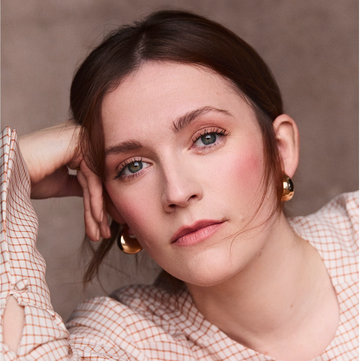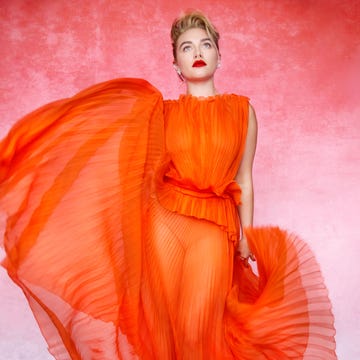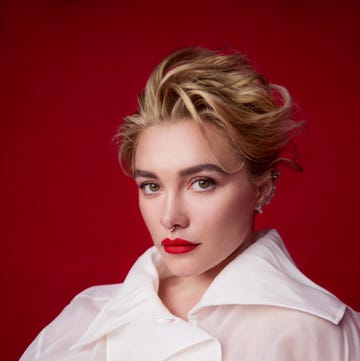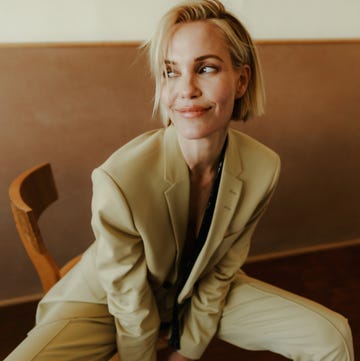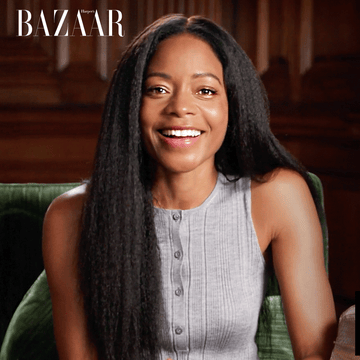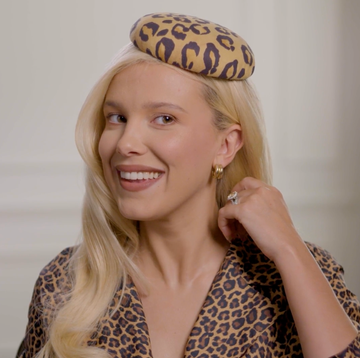Carrie Coon is talking about her baggage. Not the emotional kind — the kind she packed for six months in Thailand to shoot season three of The White Lotus. "I'm a very good packer," she says. "I experience a lot of shame if I have a heavy suitcase. I find myself telling the person checking my bag, 'I'm so sorry. I have some weights in there because there isn't a gym at this hotel….' And my husband's like, 'Nobody cares!' But I have to tell everyone why it's heavy." She takes a moment. Maybe we're talking about emotional baggage after all. "So I have a real pathological problem about that stuff. Thanks for bringing that to my attention."
The characters who check into the White Lotus each season aren't really the type for self-examination. But creator Mike White examines them anyway, and with rigour. Then he lets us peer under the microscope to see, to our horror and titillation, all our own neuroses and hypocrisies and insecurities and shames. It's not just funny ha-ha, but more funny mortifying; it's the awkward laughter of being caught.
No group of characters has encapsulated that feeling more this season than the one White calls "The Blonde Blob" — three lifelong friends on a girls' trip to reconnect, whose friendships instead regress into gossiping and passive-aggressive infighting. As the trio, Carrie Coon, Michelle Monaghan, and Leslie Bibb leave every group chat asking itself the same question: "Oh God, is this us?" (The answer is yes.)
"I love that it's confronting. I love that it can even be off-putting," says Coon. "I like art that's a little bit off-putting." Her work elsewhere reflects this. Her performance in The Leftovers (a drama about a mass rapture event that leaves her character as the lone "leftover" of her family) was a masterclass in existential exploration. Somehow, so is her performance in The Gilded Age (a drama about who can throw the fanciest party in the 1880s). Spend a little time with her, and you'll see why: Coon isn't afraid to get deep. In the first of three interviews with the Blonde Blob itself, she spoke to Harper's Bazaar about why we're so entertained by the trio's reunion from hell, and why we're so triggered by it, too.
You, Michelle, and Leslie had the challenge of building a fully-formed friendship with decades of history, then stripping away the layers of it episode after episode. How did you approach that?
We jumped on a text thread as soon as we knew who was cast, and we exchanged photographs of ourselves at around the age we thought our characters would have met, maybe eight or nine years old. So that was fun — and it's the job: building chemistry together. We were living together and getting to know each other. Leslie and I shared a villa at the Four Seasons, and Michelle and Parker [Posey] were next door. We took our meals together, went to the gym and swimming together; we were basically building a friendship as our friendship on the show was being deconstructed.
How much of their unravelling dynamic did you know of early on?
I think we understood how our storyline functioned within the season. Some of the storylines this year are quite confronting, transgressive. I would say that our storyline was the most relatable because it's the one piece of the puzzle that everybody has some relationship to. The other stuff may feel far from people's own experiences, but I think everybody has some understanding of female friendship, whether it be personally or culturally.
These women have triggered audiences because they're a reflection of ourselves at our pettiest. Watching them feels like somehow I've been caught gossiping by the entire world. Did you have a reaction like that when reading your scenes?
We'd be lying if we said we've never been in those situations. You'd have to have a lot of integrity to never gossip. I actually don't have a close group of female friends from my childhood. That's just not the way my life unfolded. So that part was actually quite far from my own experience — questioning how much of a friendship is history and force of habit and how much is actual shared interest.
It's not necessarily gendered, either. I think those questions come for every friendship eventually.
And we're all women in our 40s, reflecting and questioning our life choices. I think middle age is tricky in that way. You can't help but compare yourself to other people. We have brains built on comparison. And you're right, it's not gendered. Everybody's engaging in that because everyone is comparing themselves to others and performing "self" on some level. In this Instagram and TikTok culture, everyone is feeling like they're the odd man out. Kate occupies a rarefied air in her own small community, but doesn't really matter outside of it. Jaclyn is lonely. And Lori pretends to not be interested in Jaclyn's fame, but in fact she's really jealous of her success, and maybe she thinks, Why not me? So the storyline is really forcing us all to consider what this performance of self is getting us, you know?
Speaking of the performance of self, of the three women, Laurie's mask is the first to slip for the audience when she goes into her room in episode 1 and breaks down. Was it in some ways a relief as an actor to be the first one to get to that stage in her story?
We shot that scene on our first day. The lady villa was first up in the schedule, so for two weeks, it was just a show about the three ladies in Thailand. I was asking myself, Who am I? What am I doing? But you have to trust Mike's writing. And that moment, the way I perform it, was absolutely scripted. I think the script even said that her sobbing is short and silent and weird and then kind of goes away.
That is very specific, which is maybe why it was so horrifyingly relatable.
I've had so many people, women in particular, come up to me and say, "Oh my gosh. I feel so seen." People relate to that quiet desperation.
You're somebody who seems to live a well examined life. You've talked about the benefits of therapy, AA, and Al-Anon in your life. You're very self aware. Do you think that Laurie shares any of that self awareness?
I think she's on a journey of discovering just how much of it she has. So many of the problems we have in our relationships come from being reactive. You see a lot of reactive behaviour on this girl's trip, from everybody. If they had just shown up at the villa on day one and said, "Listen, I going to put it all out there…," and been really honest about where they were in their lives and how they were feeling, they would have had such a different vacation. But they didn't. They kept up the the performance. No relationship can survive that lack of honesty. And I think Lori's an alcoholic, and I don't think you can continue to be an alcoholic and live a fully examined life. Those two things don't really go together.
Was her drinking always so explicit in the text of her character, or was it something you expanded in the performance?
It was definitely in the text. They talk about her drinking being problematic, and it was also often scripted in our scenes that they were drinking. But I made a choice to make sure she was always drinking and that she always had one glass half gone and another one on the way. That's how she's holidaying. Her life is falling apart, and she's not being honest about it. And, geez, how many people are moving through the world that way?
In these scenes with the Russians — partying at the club and later in the villa pool — on the one hand, Laurie is clearly spiralling. But on the other hand, she does seem free. How did you approach that balance?
Well, you know, drinking is disinhibiting. And Lori has come into this vacation hoping to recapture the Cancun vacations of her youth, right? She's reliving a time before she had all these responsibilities as an adult person, these responsibilities that maybe she's not handling very well. So she is looking to recapture old times, and she feels that they've really achieved something that night.
But of course, it's Mike White. So it takes a turn. In the next episode, they get to unpack some of those behaviours that they're accusing each other of experiencing, inflicting on one another. And that's when it gets psychologically more in-depth, more of what's going on in their in their friendship, and whether or not the friendship will survive this vacation — and in fact, whether it should.
In episode 6, when the ladies are lying by the pool after Jaclyn slept with Valentin, Laurie lands this perfect passive-aggressive line reading: "You're so funny." It shook me to my bones. As an actor, do you ever leave you body after delivering a line and think, I nailed it?
I think there are actors who do. But I rarely feel that way! I just really trusted Mike. The more you sit in a character, the more natural those things become. That's if the writing is consistent, which in this case, it very much is. Also, you know, I'm from the Midwest. It's all passive aggressive. I'm here right now with my family, and our love language is criticism and sarcasm. And that doesn't always play well with people who aren't from here. I've gotten in a little trouble for that, for my love language. But it's Laurie's love language too. It's how she opens the door and sees if you're going to walk through it.
But in her own way, at least she's opening that door. She's opening up a conversation with Jaclyn.
She is, right? And she says to Kate, "I can't be like you. I'm just honest." Now, that's an excuse she's using to be able to offer up her criticisms without consequence. She just gets to land these little barbs and then be like, "I'm just being honest with you. It's the truth." Even though it may not be the whole truth, or she's not considering her part in it. She doesn't take responsibility for her part in it when she does that.
It still feels like a betrayal, even though Valentin is his own man. He doesn't belong to any of them.
And Laurie didn't actually go for it either!
But somehow it still hurts.
It's the history. It's Laurie's perception that Jacqueline has always behaved this way, put an opportunity out there, only to then seize it for herself because she needed to feel wanted and desired and liked and loved. It's all the old patterns of behaviour coming home to roost.
A certain kind of viewer — perhaps even the main demographic of the show — may be primed to dislike Kate after the scene where she more or less admitted to voting for Donald Trump. But in the episodes that follow, she's the most reasonable and relatable of the trio. It seems like Mike is challenging us there.
Completely. That's why it's fun to watch Mike's characters. They're not just one thing. Mike White grew up in the evangelical church. He grew up in some pretty specific communities, some of which were maybe not as welcoming to him, ultimately. His father wrote a very influential book about what it was like to come out as a gay man himself in the evangelical church as an adult, which a lot of young men have read and was a very meaningful text for them in their own journeys. So Mike doesn't shy away from challenging cultural conversations, and I really appreciate that about his work.
We hear a little about Laurie's life back in New York — that she's struggling with her divorce, her career, her daughter Ellie. Was it a deliberate choice to only reveal so much?
There was a bit more context to her home life. You originally found out that her daughter was actually non-binary, maybe trans, and going by they/them. You see Laurie struggling to explain it to her friends, struggling to use they/them pronouns, struggling with the language, which was all interesting. It was only a short scene, but for me, it did make the question [in episode 3] of whether Kate voted for Trump so much more provocative and personally offensive to Laurie, considering who her child is in the world. But the season was written before the election. And considering the way the Trump administration has weaponised the cultural war against transgender people even more since then, when the time came to cut the episode down, Mike felt that the scene was so small and the topic so big that it wasn’t the right way to engage in that conversation.
I believe that bitching can be constructive. It can be an outlet to work out some of your uglier or more judgmental opinions so that you can let them go before you hurt the person you're bitching about.
Look at you, justifying your choices!
Do you think bitching, or even just gossiping, could ever be constructive?
I think it's always more than one thing. I think the other way is a kind of connection, right? Laurie is feeling ostracised by her friends, and one way she can connect with Kate is to talk about Jaclyn. One way she can connect with Jaclyn is to talk about Kate. It's something they have in common, right? And she knows maybe their opinions about it will be similar.
When boys are in preschool, they say things to each other like, "I can jump higher than you!" And girls say to each other, "We're wearing the same dress. We're the same!" They're always looking for sameness, whereas boys are competitive. Because that's kind of the way we're socialised, right?
That said, I tell my husband everything. There isn't a piece of gossip I've ever heard that I haven't told Tracy. So I think you're right. In a way we're working out things. But I guess it depends on what you do with it. In Buddhism, you talk about "wise speech". Do you have to say this? Is this the right time to say it? Is saying it actually helpful? These are questions we should always ask ourselves before we open our mouths — and we almost never do.
The wardrobe on the show is famously fabulous. What does Laurie's style tell us about her versus Jaclyn and Kate?
When Alex Bovaird, our costume designer, talks about how she approached dressing us, she always talks very specifically about following Mike's note that Laurie, Jaclyn, and Kate are a "blonde blob". That they all seem the same. So we were given racks and racks of clothing that any of these women might wear. From that, we got to narrow down what it was that we thought our particular characters might wear.
For me, it was important to go hard on the New York of it all with her. You know, New Yorkers, their wardrobes are black. She's not going to have a lot of bold colours. So I chose things that seemed like they were intentionally selected for a vacation, but were not quite right. It was even important to me that Laurie's nail colour be this weird, bluish-purple that was just a little off, that didn't quite go — which I then had to wear for six months! Her floppy hat is maybe not flattering, but it does protect her from the sun, which would be important to her. She didn't have time to go on a big shopping trip like Kate would have. Kate's wardrobe was probably entirely new and bought specifically for this vacation. And I don't think Laurie had the time to do that, working the hours she's working. I think she packed pretty haplessly. So it was important to me that she always feel just a little bit off.
Which of these three women would you actually want to go on holiday with?
I mean, Laurie sure does let loose and have a good time. But Jaclyn will get you in all the restaurants. And I bet Kate, if left her own devices, would plan the whole itinerary. So everybody has their benefits. But I've never been great in a group. Yeah, I'd rather be alone.
This interview has been edited and condensed for clarity.
Stylist: Alicia Lombardini. Hair: Peter Butler. Make-up: Rebecca Restrepo.






